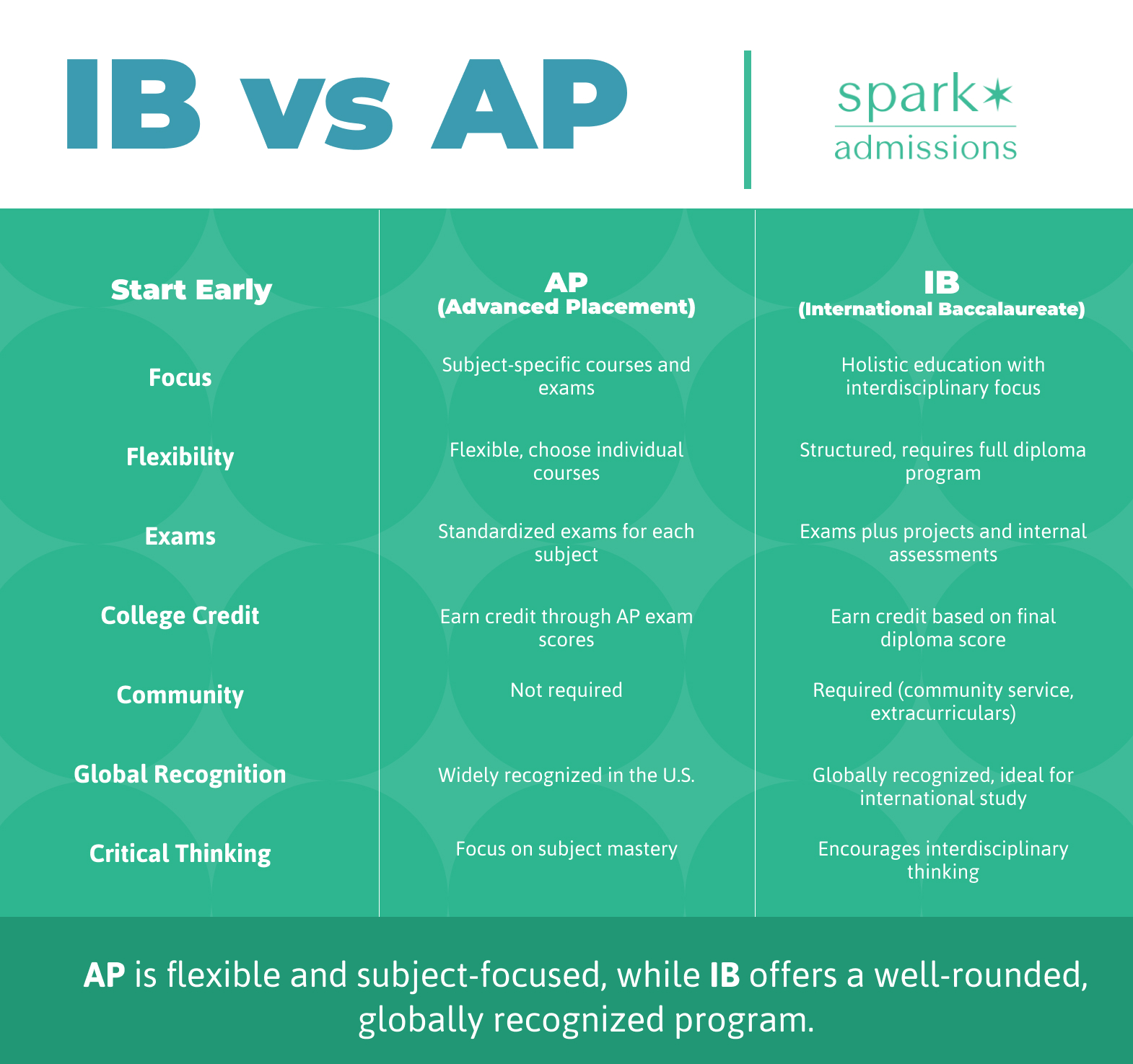- Blog
- > College Admissions
What Are IB Classes? International Baccalaureate Explained
- Dr. Rachel Rubin
- | April 3, 2025

The International Baccalaureate (IB) program is a globally recognized academic framework designed to challenge high school students through rigorous coursework, critical thinking, and a commitment to international education. IB classes focus on developing well-rounded students by emphasizing intellectual, personal, emotional, and social growth.

What Are IB Classes?
IB classes are part of the broader International Baccalaureate program, which was developed to provide students with a comprehensive and internationally recognized education. These courses emphasize analytical thinking, research skills, and independent learning, preparing students for the demands of college-level coursework. IB courses span multiple subject groups, including language acquisition, sciences, mathematics, the arts, and individuals and societies.
Unlike traditional high school classes, IB classes incorporate internal assessments and oral presentations to evaluate student understanding. Many IB students find that these assessments help them develop independent thinking and critical analysis skills, which are essential for success in higher education.
The IB Diploma Program
The IB Diploma Program (IBDP) is a rigorous two-year curriculum for students in their final years of high school. IB diploma students take courses from six subject groups, ensuring a well-rounded education. The IB diploma programme also includes three core components: the Extended Essay, Theory of Knowledge, and Creativity, Activity, and Service (CAS). These elements push students to engage in research, critical thinking, and community service, setting them apart in college applications.
A key advantage of the IB diploma program is its international recognition. Most colleges appreciate the depth and breadth of IB coursework, and many institutions offer college credit to students who earn high scores on IB exams. This means that IB diploma students can often earn credit before even stepping onto a college campus, saving both time and tuition costs.
Individual IB Courses vs. Full IB Diploma
Students have the option to take individual IB courses without enrolling in the full IB diploma. These individual IB classes allow students to challenge themselves academically without committing to the entire diploma program. For example, a student might take IB English Literature or an IB science course alongside AP classes. This flexibility makes the IB program accessible to a wider range of students who may not want to complete the full IB diploma but still seek advanced coursework.
While the full IB diploma requires students to complete six subject groups and the core components, taking individual IB courses can still provide significant benefits. High school students who take IB classes often develop strong research and writing skills, preparing them for college-level courses.
IB Exams and College Credit
At the end of each IB course, students take IB exams to assess their knowledge and skills. Passing IB exams can lead to college credit at many universities. Similar to AP exams, IB exams test students on their understanding of course material, though IB assessments often include more written analysis and independent research.
IB students must prepare for exams through a combination of coursework, internal assessments, and extended research projects. Unlike AP exams, which are primarily multiple-choice and essay-based, IB exams frequently include components such as oral presentations and case studies.
Many colleges recognize IB exam scores when awarding credit. While policies vary, some universities grant advanced standing or waive prerequisite courses for students who score well on IB exams. For students looking to manage college-level coursework before entering higher education, IB classes can be an excellent way to get a head start.

IB vs. AP Breakdown
Both AP and IB programs offer rigorous coursework designed to prepare students for college. The AP program, created by the College Board, allows students to take individual AP courses and exams in specific subjects. AP classes are widely available in high schools across the United States and are known for their standardized exams.
In contrast, the IB program provides a more holistic approach to education. IB students must engage in interdisciplinary learning, extended research projects, and community service. While AP courses focus primarily on subject-specific knowledge, IB courses encourage critical thinking across multiple disciplines.
Students who take both IB and AP classes may find that each program offers unique benefits. AP exams provide a more flexible option for students who want to earn college credit without committing to a full diploma program. However, the IB diploma programme is particularly valuable for students seeking an internationally recognized diploma that emphasizes well-rounded academic development.
The Benefits of the IB Program
The IB program prepares students for college and beyond by fostering independent thinking, research skills, and global awareness. IB diploma students often excel in university settings because they have experience managing complex coursework and conducting in-depth research.
IB classes offer several advantages for students aiming to excel academically and prepare for higher education. Some benefits include:
- College Credit Opportunities: Many universities recognize IB courses and allow students to earn college credit for high IB exam scores.
- Enhanced Critical Thinking: The IB curriculum fosters independent thinking and problem-solving skills.
- Global Perspective: The international focus of IB programs helps students develop a broader worldview.
- Strong Writing and Research Skills: Assigning oral presentations, extended essays, and internal assessments enhances students’ communication and analytical abilities.
- Preparation for College Coursework: The IB diploma programme equips students with the skills needed to succeed in college courses and beyond.
Many students who complete the IB diploma program or take IB courses find that they are better equipped to handle the demands of college. The IB program challenges students academically while also encouraging service hours and extracurricular involvement, leading to a more well-rounded education.
Is the IB Program Right for You?
Deciding between IB courses, AP courses, or a mix of both depends on a student’s academic goals and interests, as well as your specific high school’s offerings. High school students who thrive in an environment that emphasizes research, oral presentations, and extended writing may find the IB diploma programme particularly rewarding. Those who prefer subject-specific coursework with a strong emphasis on standardized testing may gravitate toward the AP program.
Regardless of the path chosen, both IB and AP programs offer excellent preparation for college. IB students gain a unique advantage through the program’s focus on interdisciplinary learning and international education, which can set them apart in the college admissions process.
Taking IB Classes Can Increase College Admissions Chances
The International Baccalaureate program provides students with a challenging, globally recognized education that fosters critical thinking, independent research, and international awareness. IB classes prepare students for college-level coursework while also encouraging a deeper understanding of subjects across multiple disciplines.
For students considering the full IB diploma or individual IB courses, the program offers numerous benefits, from earning college credit to developing skills that will last a lifetime. Whether a student chooses to pursue the full IB diploma program or take select IB courses, the experience can be a valuable stepping stone to future academic and career success.
Navigating the IB program and making the right choices for your academic future can be overwhelming. Spark Admissions can help you strategize your coursework, optimize your college applications, and maximize your potential for success. Contact Spark Admissions today to receive expert guidance tailored to your goals.


